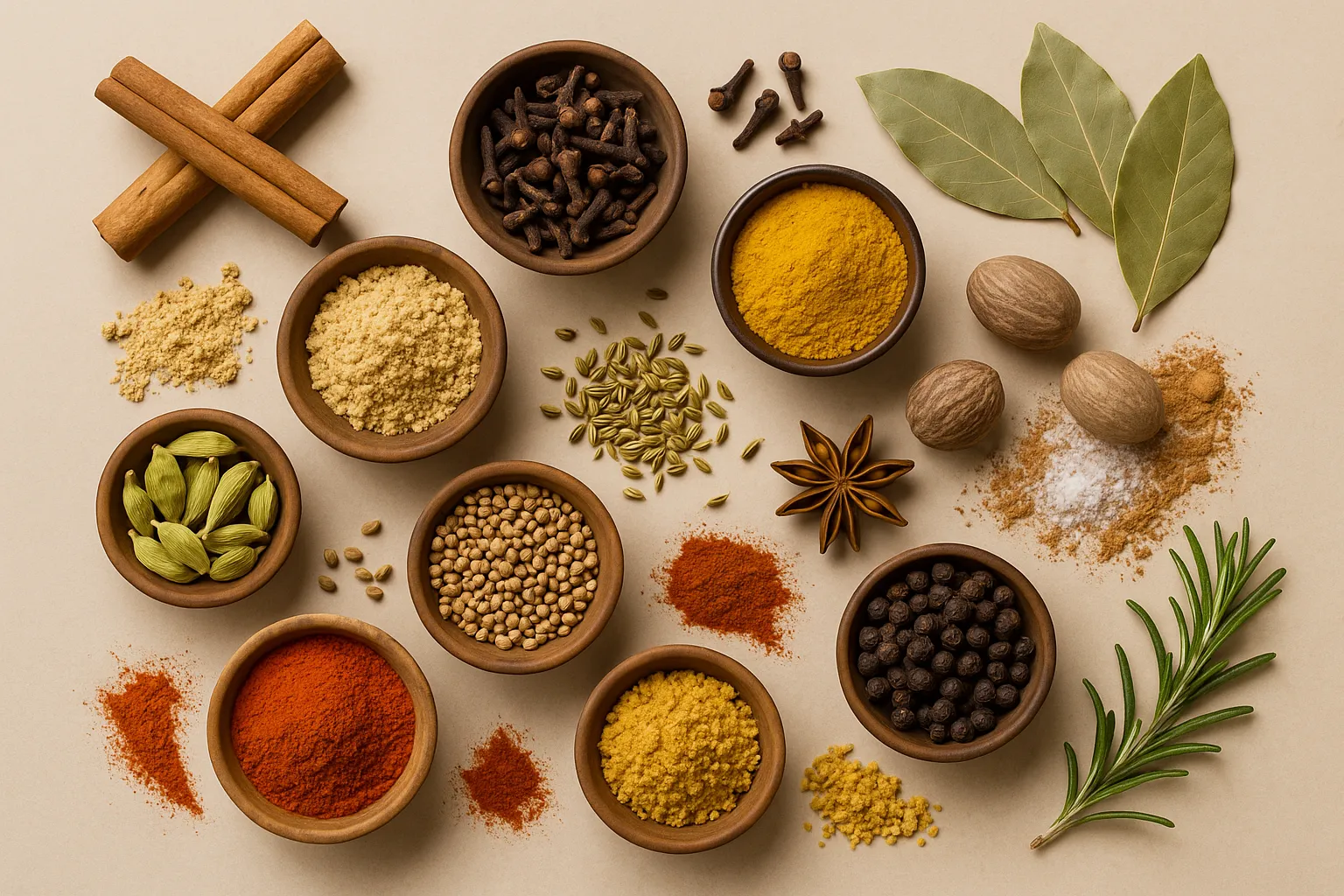When you think of spices, you probably picture delicious meals and comforting aromas in the kitchen. But many everyday spices hiding in your pantry can do far more than flavor food—they can also act as natural, eco-friendly cleaners. From fighting mold to repelling pests and deodorizing your home, these simple ingredients have powerful properties that make them useful well beyond cooking. The best part is that they’re safe, affordable, and already within arm’s reach. Instead of reaching for harsh chemicals, you can rely on what you already have at home to keep your space clean, fresh, and inviting.
1. Cinnamon – Fights Mold and Freshens Air
Cinnamon isn’t just for your morning oatmeal or holiday cookies—it can actually help keep your home cleaner and fresher. Thanks to its natural antifungal properties, cinnamon works wonders in preventing mold and mildew from spreading in damp areas like bathrooms and basements. Beyond that, its warm and inviting scent is a natural way to freshen up any room. I’ve personally boiled a few sticks on the stove during winter, and the house smelled like a cozy bakery for hours. It’s such a simple trick that makes cleaning feel a little less like a chore. A practical way to use it is by sprinkling some cinnamon powder in corners prone to moisture or adding a stick to a pot of boiling water to naturally perfume the air.
2. Cloves – Antibacterial Powerhouse
Cloves are well-known in traditional remedies, but their cleaning power is just as impressive. Containing eugenol, a strong antibacterial and antifungal compound, cloves are perfect for disinfecting and neutralizing odors in the home. I remember once simmering a handful of cloves on the stove when the kitchen smelled strongly after cooking fish—the difference was instant. The sharp, spicy fragrance cuts through unwanted odors, leaving the air crisp and pleasant. You can also grind cloves and mix them with baking soda to create a natural scrubbing powder that works well on sinks and stovetops.
3. Turmeric – Stain Remover & Antiseptic
Turmeric is famous for its golden color and health benefits, but it also carries antimicrobial qualities that make it useful in cleaning. It can help tackle stubborn stains naturally, especially when combined with something acidic like lemon juice. I once used it to brighten up a wooden cutting board that had seen better days—it looked revived and fresh again. But you do need to be careful; turmeric is powerful and can stain surfaces if left too long. To make the most of it, create a paste of turmeric and lemon juice and apply it to discolored areas for a quick, natural lift.
4. Ginger – Natural Degreaser
Fresh ginger has a zesty bite and natural enzymes that make it a surprisingly good degreaser. It can help cut through oily messes on stovetops, countertops, or even pans that feel impossible to scrub clean. I once tried boiling slices of ginger to make a natural spray after a big frying session, and it worked wonders. Not only did it remove the greasy film, but it also left behind a refreshing aroma that made the kitchen feel instantly renewed. A simple way to use it is by simmering ginger in water and repurposing the cooled liquid as a natural cleaner.
5. Bay Leaves – Insect Repellent
Bay leaves might not directly clean your counters, but they’re an old-fashioned and effective way to keep pests at bay. Their natural compounds repel insects like cockroaches, moths, and even ants. Growing up, I remember my grandmother always tucking a few dried bay leaves into cupboards and pantry shelves, and she rarely had to deal with unwelcome critters. It’s such a fuss-free method—you just slip a few whole leaves in problem areas, and they act as a natural barrier. This is especially handy if you want to avoid chemical repellents in food storage areas.
6. Black Pepper – Keeps Ants Away
Ant invasions can be frustrating, but black pepper offers a simple and safe solution. Its sharp aroma acts as a deterrent, redirecting ants without harming them. I once sprinkled a thin line of ground pepper across a windowsill where ants were sneaking in, and by the next day, the trail had completely disappeared. It’s a quick, inexpensive fix when you don’t want to reach for harsh chemicals. Just sprinkle it along cracks, entry points, or paths where you’ve seen ants, and it helps break their trail effectively.
7. Mustard Powder – Grease & Odor Fighter
Mustard powder is one of those pantry staples that often sits unused, but it has surprising cleaning abilities. With antibacterial properties and natural grease-cutting power, it can revive greasy pans or tackle lingering kitchen odors. I once added a spoonful of mustard powder to warm water to soak a greasy skillet, and it lifted off the residue much faster than soap alone. You can also mix it into dish soap to give your cleaning routine a boost. It’s a great example of how something simple can make a big difference.
8. Nutmeg – Deodorizer with Antibacterial Properties
Nutmeg isn’t just for desserts—it’s also a gentle deodorizer with antibacterial qualities. It helps freshen spaces and neutralize unpleasant smells, making it perfect for areas like trash bins or carpets. I’ve mixed nutmeg with baking soda before sprinkling it lightly over a rug, and after vacuuming, the whole room smelled subtly warm and clean. It’s a small, natural touch that feels much more inviting than synthetic sprays. Try using it in bins, cupboards, or even shoes for a simple way to keep things smelling pleasant.
9. Cardamom – Freshens and Deodorizes
Cardamom has a sweet, citrus-like aroma that can neutralize bad smells and leave behind a refreshing fragrance. I once boiled a few pods after cooking with garlic and onions, and it quickly cleared the lingering odor from the kitchen. The scent is uplifting and makes your space feel instantly fresher. To use it, simmer a handful of cardamom pods in water and let the steam spread throughout your home, or grind some pods and mix with baking soda to deodorize carpets naturally.
10. Coriander Seeds – Gentle Surface Cleaner
Coriander seeds contain natural oils with antibacterial properties, making them useful for light cleaning tasks. I tried using a coriander-infused spray once on my wooden dining table, and it left a subtle, earthy scent while also giving the surface a nice shine. To make your own cleaner, boil coriander seeds in water, strain, and use the cooled liquid in a spray bottle for wiping down counters, tables, or shelves.
11. Fennel Seeds – Odor Neutralizer
Fennel seeds are not just soothing for digestion; they also have natural deodorizing powers. Their mild, sweet fragrance works well in neutralizing musty or unpleasant smells in enclosed spaces. I used to keep a small jar of fennel seeds in my car cup holder during summer, and it made long drives much more pleasant. Try sprinkling crushed fennel seeds in garbage bins or simmering them in water to freshen the air at home.
12. Cumin – Natural Antiseptic Cleaner
Cumin seeds have antimicrobial properties that make them helpful for simple cleaning purposes. Their distinct aroma may not be for everyone, but it does a great job in cleansing and disinfecting surfaces. I once used a cumin-infused solution to clean my cutting board after prepping meat, and it felt like a natural and safe option. You can boil cumin seeds, strain the water, and use the liquid as a gentle cleaner in the kitchen.
13. Star Anise – Air Freshener & Insect Repellent
Star anise isn’t just pretty to look at—it also doubles as a natural cleaner. Its strong, licorice-like aroma helps repel insects and leaves the air smelling fresh. I once placed a few star anise pods in a bowl in my living room, and guests kept asking what smelled so unique and pleasant. To use it practically, simmer a few pods in water for an instant air freshener or place them in pantry corners to keep moths away.
14. Saffron – Gentle Antibacterial Touch
Saffron is known for its luxurious use in cooking, but it also carries antibacterial properties. While it’s not the cheapest spice to clean with, even a few threads can add a natural cleansing boost to water. I once added a pinch to warm water to clean glassware, and not only did it help with stains, but it also left a subtle aroma. For occasional use, saffron-infused water can act as a natural rinse for delicate surfaces.
15. Paprika – Rust Cleaner
Paprika might surprise you as a cleaning spice, but its mild abrasiveness and antioxidants make it useful for scrubbing rusty spots on cookware. I once experimented by mixing paprika with vinegar to clean a small rust spot on a pan, and it worked better than I expected. To use it, create a paste of paprika and lemon juice, then rub it on rusty areas before rinsing thoroughly.
16. Fenugreek – Odor Absorber
Fenugreek seeds have a strong aroma that can actually help absorb other unpleasant smells when used correctly. Growing up, I remember my mother roasting fenugreek seeds in a pan to freshen up the kitchen after heavy cooking—it worked like a charm. You can lightly roast the seeds in a dry pan and leave them in a bowl to neutralize odors in any room. They’re especially good at cutting through lingering cooking smells.
17. Chili Powder – Natural Pest Deterrent
Chili powder isn’t just for spicing up your meals—it can also help keep pests away. Its strong capsaicin content irritates insects and discourages them from invading your space. I once sprinkled a thin line of chili powder near a doorway where ants were sneaking in, and they immediately stopped crossing the area. To use it safely, sprinkle chili powder in outdoor corners, garden beds, or near entry points. Just be mindful around pets and children, as it can be irritating if touched or inhaled.
18. Rosemary – Antimicrobial and Deodorizing Herb
Rosemary is a fragrant herb with natural antibacterial and antifungal properties, making it perfect for light cleaning and freshening the air. I remember boiling rosemary sprigs on the stove during the holidays, and not only did it make the kitchen smell like a Mediterranean garden, but it also seemed to clear the stuffy air. To put it to use, steep fresh or dried rosemary in hot water, let it cool, and transfer it into a spray bottle to clean counters and surfaces. You can also hang dried rosemary bundles in closets to keep clothes smelling fresh.
Your spice rack is more than a tool for cooking—it’s a secret cleaning arsenal waiting to be used. Everyday spices like cinnamon, cloves, turmeric, and rosemary not only add flavor to meals but also help you create a healthier, fresher living environment. By using these natural options, you reduce your dependence on chemical-based products, save money, and bring a touch of tradition back into your home. Next time you notice a stubborn stain, unpleasant odor, or unwanted pests, take a quick look in your kitchen—you might already have the perfect solution.


